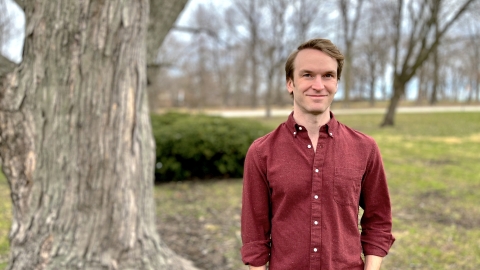
Matt Kandler '10, Mechanical Engineering
January 6, 2023
Like most entrepreneurs, Matt Kandler '10 didn't succeed on his first try — and his failure led to his success. Photo by Melissa Siskind
During his junior and senior years, Matt Kandler '10 put his programming and mechanics skills to use to help Professor Keith Buffinton, mechanical engineering, create a walking robot. The experience was so impactful, it inspired Kandler to follow in Buffinton's footsteps and pursue his Ph.D. at Stanford, Buffinton's alma mater.
But when he arrived in Silicon Valley, the buzz of the tech boom shifted Kandler's focus from mechanics and robotics to design. "There's a real ecosystem there. It's just something in the air," Kandler says. "The second you walk on campus, you're like, 'I'm going to start a tech company.' Everyone's talking about ideas all the time."
He quickly partnered up with a good friend, a software engineer, and together, they entered the tech-startup world. Eventually, Kandler found himself pursuing "ideas that every young startup hopeful has — but that never work."
As he grappled with failure and defined his next steps, he leaned on a research-backed practice grounded in positive psychology: gratitude journaling, which entails recording and reflecting on things one is grateful for on a regular basis.
This work to preserve his mental health in the face of adversity led Kandler to a new idea.
Enter: Happyfeed.
Part journaling app, part social platform, Happyfeed is Kandler's intentional vision to provide an outlet "to break from the negativity in mainstream social channels."
Negative impacts of social media are showing up in mental health research. Comparison, cancel culture and cyberbullying have transformed online experiences, forcing the need for robust mental health support in high schools, colleges, and workplaces.
Apps are commonly used as tools for awareness and mindfulness. In some widely-used mental health apps, "you're basically watching TV on your phone," Kandler says. "It tells you that you're getting healthier, and maybe that's good for you. But maybe it's just time to go for a walk." In other instances, apps encourage daily mood tracking, "but if you're actually depressed, telling yourself how and why you feel bad every day — that reinforcement is just going to make you feel worse."
Happyfeed takes a different approach. "I wanted to take an existing habit — scrolling on Instagram or Facebook or Twitter — and turn it into something that's research-backed and actually good for you," says Kandler, who also works as a full-stack web developer, building apps that combine a strong user interface with intuitive design.
Users who download the app are greeted with positivity from every angle. Inspiring prompts, easy and optional sharing, and intuitive functionality make Happyfeed a simple habit to pick up.
"And journaling is at the core of it," Kandler says. "It's a positive, daily practice that you can do by yourself — or share with friends — and it's scientifically proven to make you a happier person."
